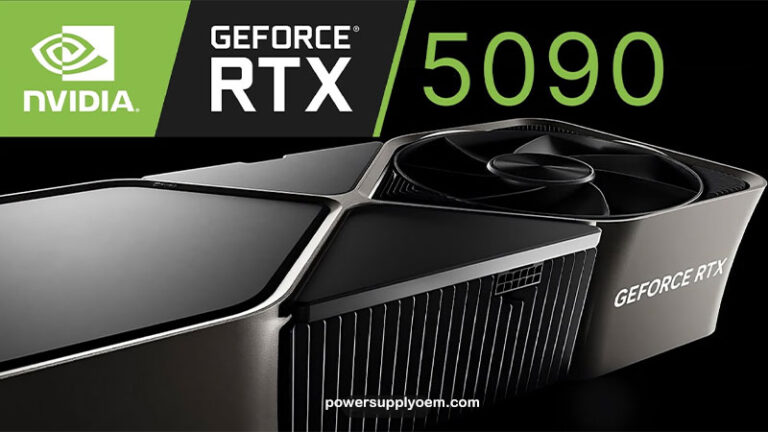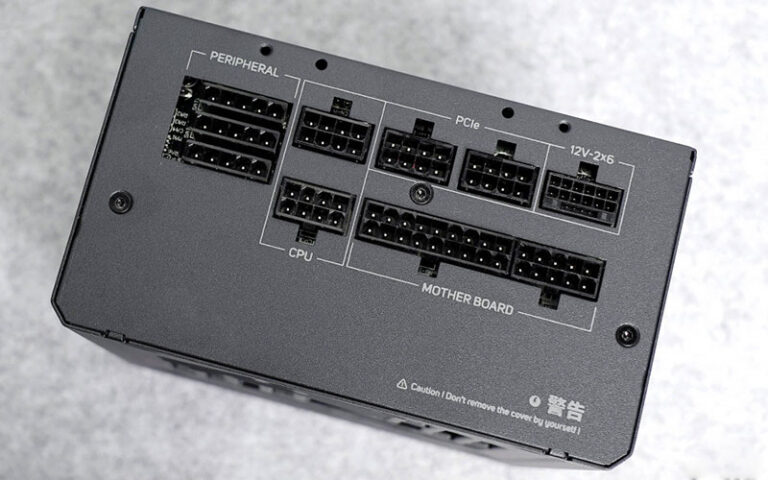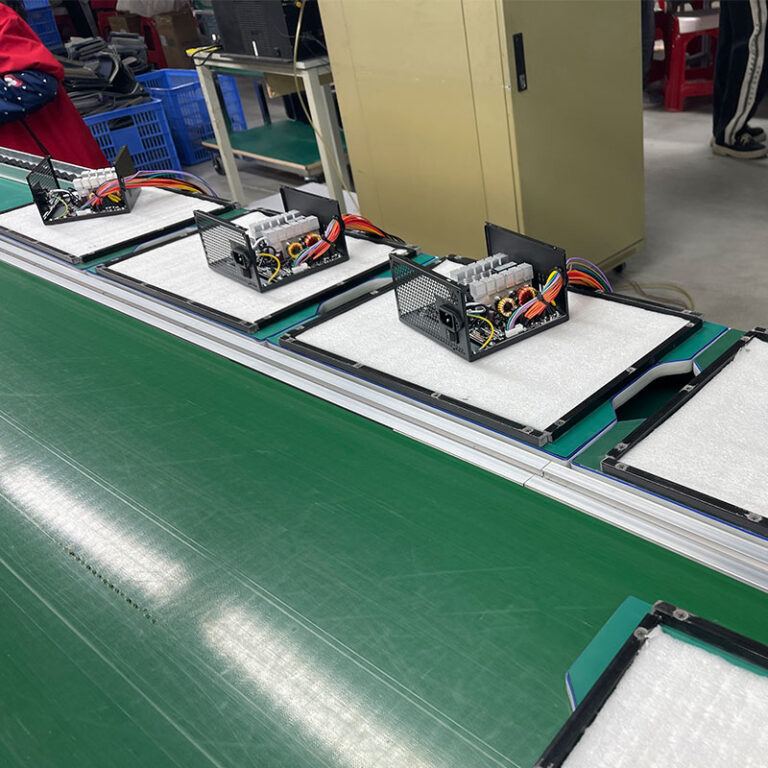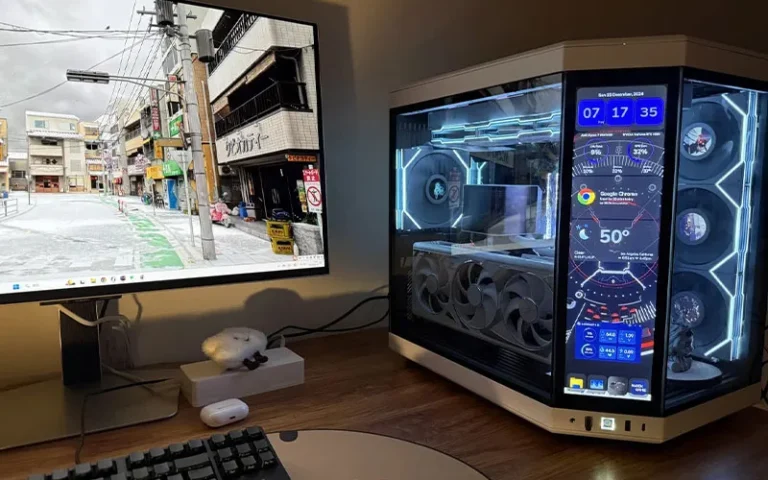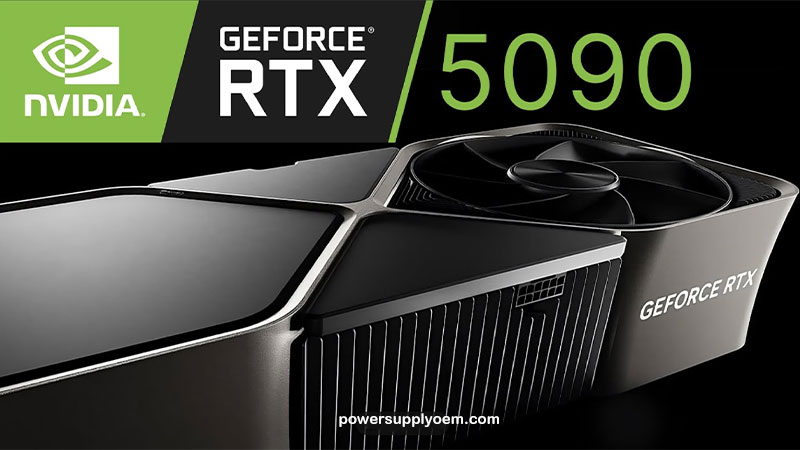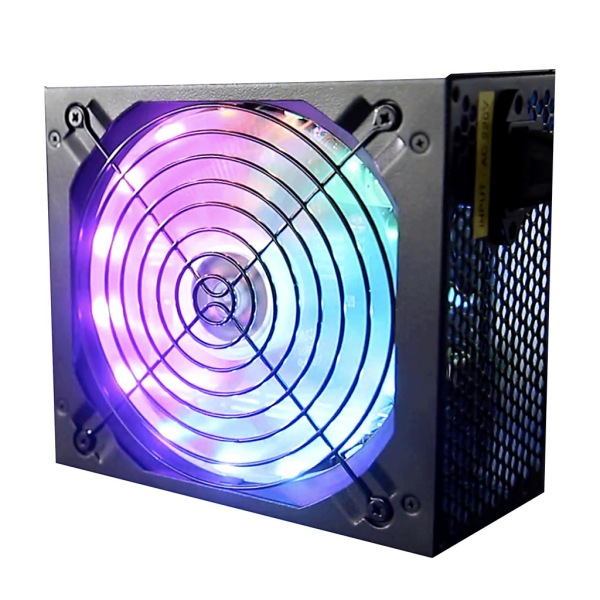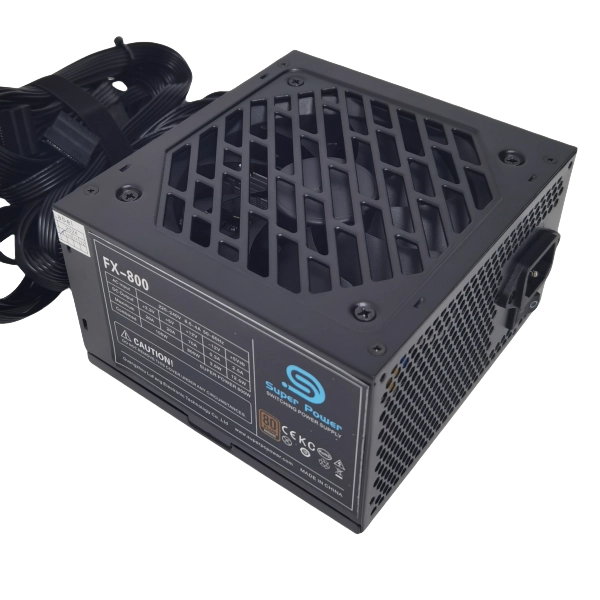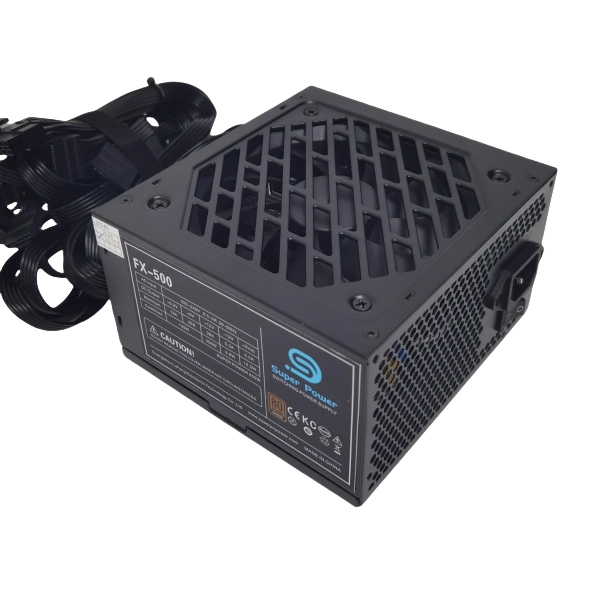-
Building E, No. 65 Xingshan North Road, Liangtian, Baisha Industrial Park, Baiyun District, Guangzhou
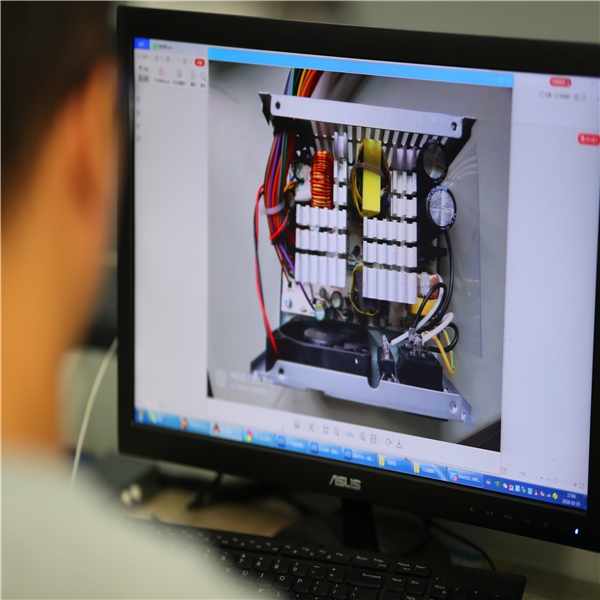
Understanding the Difference Between SFX and ATX PSUs
SFX and ATX PSU: Which Power Supply is Right for Your PC Build?
When building a PC, choosing the right power supply unit (PSU) is crucial. Two common form factors you’ll encounter are ATX and SFX. This guide explores the difference between SFX and ATX power supplies, helping you understand their sizes, compatibility, use cases, and which one is the right choice for your next PC build. We’ll also touch upon SFX-L power supplies. We’ll highlight top brands like Corsair and Cooler Master, and Silverstone.
Table of Contents
1. What is an ATX PSU?
ATX (Advanced Technology eXtended) is the most common form factor for power supplies in standard desktop PCs. ATX PSUs are considered the industry standard. ATX power supplies have a standardized size and mounting hole pattern, making them compatible with most standard PC cases and motherboards.
Key features of ATX PSUs:
- Size: Typically around 150mm (W) x 86mm (H) x 140mm (D), though length can vary.
- Wattage: Available in a wide range of wattages, from around 300W to over 1600W, catering to everything from basic office PCs to high-end gaming rigs and workstations.
- Connectors: Include a 24-pin ATX connector for the motherboard, 4+4 pin EPS/ATX12V connector for the CPU, PCIe connectors for graphics cards, SATA connectors for storage drives, and Molex connectors for older peripherals.
- Compatibility: Compatible with most standard ATX cases and motherboards (ATX, Micro-ATX, Mini-ITX in many cases).
- ATX PSUs are common.
ATX power supplies are a versatile and widely available option for most PC builds.
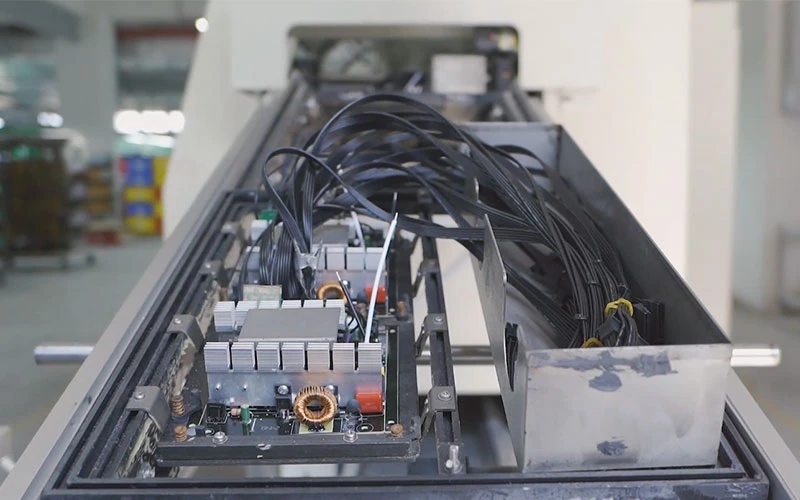
2. What is an SFX PSU?
SFX (Small Form Factor) power supplies are designed for small form factor (SFF) PCs, where space is limited. SFX PSUs are significantly smaller than ATX units, allowing for compact PC builds without sacrificing too much power.
Key features of SFX PSUs:
- Size: Standard SFX dimensions are 125mm (W) x 63.5mm (H) x 100mm (D).
- Wattage: Typically range from 300W to around 850W, with some high-end models reaching 1000W. SFX power supplies offer higher power density.
- Connectors: Usually include the same connectors as ATX PSUs (24-pin ATX, EPS/ATX12V, PCIe, SATA, Molex), though the number of connectors might be fewer due to the lower wattage.
- Compatibility: Designed for small form factor cases, often used with Mini-ITX and some Micro-ATX motherboards. Many SFX PSUs come with a bracket (an ATX adapter bracket) that allows them to be mounted in standard ATX PC cases.
SFX PSUs are the right choice for builders prioritizing a compact PC footprint.
3. What is an SFX-L PSU?
SFX-L is a variation of the SFX form factor. SFX-L power supplies are slightly longer than standard SFX units, typically around 125-130mm longer in depth (compared to 100mm for standard SFX). The extra length allows for:
- Larger Fan: SFX-L PSUs can accommodate a 120mm fan, compared to the 80mm or 92mm fan typically found in standard SFX units. This can result in quieter operation and better cooling.
- Higher Wattage: Some SFX-L PSUs offer higher wattage ratings than standard SFX units, although this is becoming less of a differentiator as standard SFX technology improves.
SFX-L PSUs are a good option if you need more power or quieter operation than a standard SFX PSU can provide, but still need a smaller unit than a standard ATX PSU. However, it’s crucial to check compatibility with your PC case, as some compact cases only support standard SFX dimensions.
4. Size Comparison: ATX vs. SFX vs. SFX-L
Here’s a table summarizing the typical dimensions of each form factor:
| Form Factor | Width (mm) | Height (mm) | Depth (mm) |
| ATX | 150 | 86 | 140+ |
| SFX | 125 | 63.5 | 100 |
| SFX-L | 125 | 63.5 | 125-130 |
The overall size difference is very significant. As you can see, SFX and SFX-L PSUs are significantly smaller than ATX PSUs, making them ideal for compact builds. The smaller SFX units are the best option for specific builds.
5. Compatibility: Cases, Motherboards, and Components
Compatibility is a key consideration when choosing between ATX, SFX, and SFX-L PSUs:
- Cases: Most standard desktop PC cases are designed for ATX power supplies. Small form factor cases are typically designed for SFX or, less commonly, SFX-L PSUs. Always check your PC case’s specifications to see which PSU form factors it supports. Many cases offer support and multiple motherboard compatibility options.
- Motherboards: Motherboard size (ATX, Micro-ATX, Mini-ITX) doesn’t directly dictate PSU compatibility. The case determines the PSU form factor. However, smaller motherboards (like Mini-ITX motherboard options) are more commonly used in small form factor builds that require SFX or SFX-L PSUs. You will often use a mini-itx motherboard with an SFX PSU.
- Components: The PSU must have enough connectors and sufficient wattage to power all your components, including the CPU, GPU, storage drives, and fans. High-end components, especially GPUs, have higher power requirements.
- GPU support and multiple motherboard compatibility is important to keep in mind.
ATX to SFX Adapters: Many SFX PSUs include an ATX to SFX adapter bracket. This bracket allows you to mount an SFX PSU in a case designed for an ATX PSU. This can be useful if you want to reuse an SFX PSU in a larger build or if you want the option to switch to a smaller case in the future. You may also need an ATX adapter.
6. Wattage and Efficiency: Do SFX PSUs Compromise on Power?
Historically, SFX PSUs offered lower wattage options compared to ATX units due to their smaller size and the challenges of dissipating heat in a confined space. However, advancements in PSU technology have significantly narrowed this gap.
- Wattage: It’s now possible to find SFX PSUs with wattage ratings up to 850W, and even 1000W in some cases, which is sufficient for many high-end gaming PCs. While ATX PSUs still offer the highest wattage options (over 1600W), SFX PSUs can now provide enough power for most mainstream and even many high-end builds.
- Efficiency: SFX PSUs are available with the same 80 PLUS efficiency certifications (Bronze, Silver, Gold, Platinum, Titanium) as ATX PSUs. You don’t have to sacrifice efficiency when choosing an SFX PSU.
In short, while ATX PSUs still offer the absolute highest wattage options, SFX PSUs have come a long way and can provide ample power and efficiency for a wide range of PC builds. You can find high quality SFX power supplies. The Corsair SF series are popular.
7. Cabling: Modular vs. Non-Modular in SFX and ATX PSUs
Both ATX and SFX PSUs are available in non-modular, semi-modular, and fully modular configurations:
- Non-Modular: All cables are permanently attached. This can lead to cable clutter, especially in small form factor builds.
- Semi-Modular: Some essential cables (like the 24-pin ATX and CPU power cables) are permanently attached, while others are detachable.
- Fully Modular: All cables are detachable, allowing you to use only the cables you need.
For SFX PSUs, modularity is even more important than with ATX PSUs due to the limited space in small form factor cases. A fully modular SFX PSU allows for much cleaner cable management and better airflow.
Another consideration with SFX PSUs is cable length. Because they’re designed for smaller cases, the cables are often shorter than those found on ATX PSUs. If you’re using an SFX PSU in an ATX case (with an adapter bracket), make sure the cables are long enough to reach all your components. Sometimes very limited space means cable length is crucial.
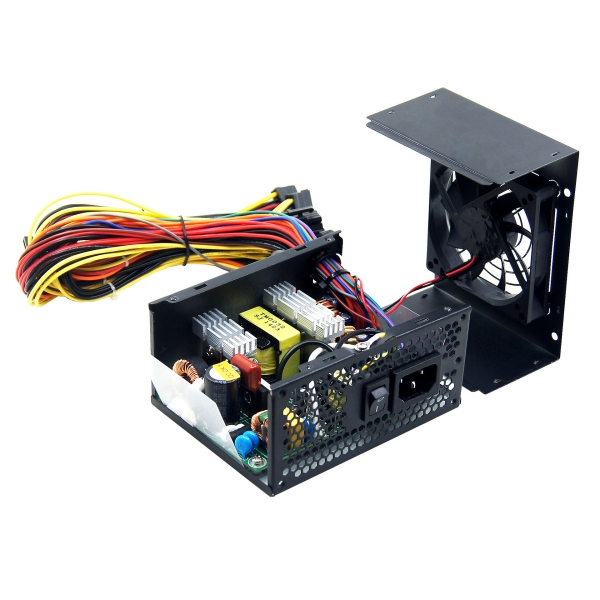
8. Noise Levels: Are SFX PSUs Louder?
Due to their smaller size, SFX PSUs traditionally had smaller fans (80mm or 92mm) that needed to spin faster to provide adequate cooling, resulting in higher noise levels compared to ATX PSUs with larger fans (typically 120mm or 140mm).
However, advancements in fan technology and PSU design have mitigated this issue. Many high-quality SFX PSUs now use more efficient components and improved fan designs to achieve quieter operation. SFX-L PSUs, with their slightly larger size, can accommodate 120mm fans, further reducing noise levels.
While some SFX PSUs can still be louder than their ATX counterparts, especially under heavy load, it’s no longer a universal rule. You can find quiet SFX PSUs, especially from reputable brands like Corsair, be quiet!, and Seasonic.
9. Price: Is There a Cost Difference?
Generally, SFX PSUs tend to be more expensive than ATX PSUs with comparable wattage and efficiency ratings. This is due to the challenges of miniaturizing the components and achieving high power density in a smaller form factor.
However, the price difference isn’t always significant, and it’s often worth paying a small premium for the benefits of an SFX PSU if you’re building a small form factor PC.
10. Choosing the Right PSU for Your Build: ATX or SFX?
The choice between an ATX and SFX PSU ultimately depends on your PC case and your priorities:
- Choose an ATX PSU if:
- You have a standard ATX or larger PC case.
- You need the absolute highest wattage options (over 1000W).
- You prioritize the widest selection of models and price points.
- You are not concerned about space constraints.
- Choose an SFX PSU if:
- You have a small form factor case that requires an SFX PSU.
- You prioritize a compact PC build.
- You’re willing to pay a slight premium for the smaller size.
- You want to have a mini-ITX motherboard.
- Choose an SFX-L PSU if:
- You want the benefits of an SFX PSU but you have more space.
- You want lower noise levels.
Remember to always check your PC case’s specifications to determine the compatible PSU form factor. You should always be careful when building a PC.
Frequently Asked Questions
Can I use an SFX PSU in an ATX case?
Yes, many SFX PSUs include an ATX to SFX adapter bracket that allows you to mount them in an ATX case. However, make sure the cables are long enough to reach all your components.
Are SFX PSUs less reliable than ATX PSUs?
Not necessarily. Reliability depends on the quality of the components and manufacturing, not the form factor. Reputable brands offer reliable SFX PSUs.
Do SFX PSUs have fewer connectors than ATX PSUs?
Generally, yes. Due to their smaller size and lower wattage ratings, SFX PSUs typically have fewer connectors than ATX PSUs. However, they usually have enough connectors for most small form factor builds.
Are SFX PSUs louder than ATX PSUs?
Traditionally, yes, due to smaller fans. However, many modern, high-quality SFX PSUs are designed for quiet operation. SFX-L PSUs can be even quieter due to their larger fans.
What’s the difference between SFX and SFX-L?
SFX-L PSUs are slightly longer than standard SFX PSUs, allowing for larger fans (typically 120mm) and potentially higher wattage ratings.
What is the best PSU for a mini-ITX build?
An SFX or SFX-L is likely your best option.
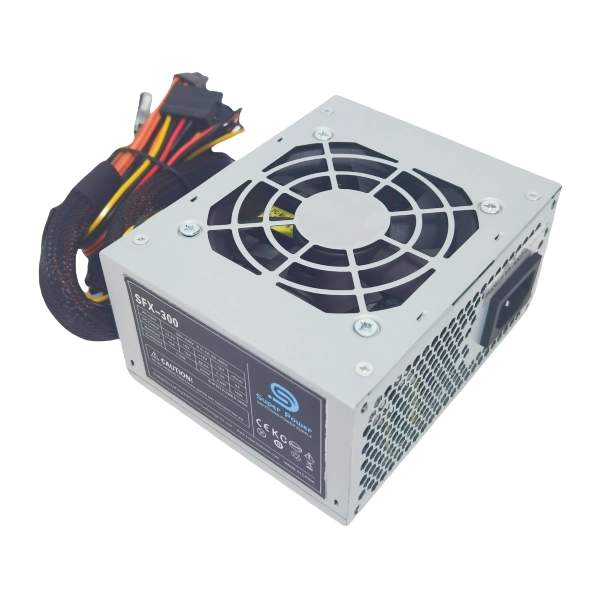
Summary
- ATX and SFX are two common PSU form factors. ATX is the standard for most desktop PCs, while SFX is designed for small form factor builds.
- SFX PSUs are significantly smaller than ATX PSUs, but they can still provide ample power for many systems, even high-end gaming PCs.
- SFX-L PSUs are a slightly larger variation of SFX, offering potentially quieter operation and higher wattage options.
- Compatibility with your PC case is the primary factor in determining whether you need an ATX or SFX PSU.
- SFX PSUs often include an ATX adapter bracket for use in larger cases.
- Modern SFX PSUs can offer comparable efficiency and reliability to ATX PSUs, although they might be slightly more expensive.
- Always choose a PSU from a reputable brand and ensure it has the necessary connectors and sufficient wattage for your components.
- We offer a PC POWER SUPPLY for every build.
- Choosing the correct PSU will make for a smooth build.
- The Cooler Master’s V series is a popular option.
- Consider a PSU such as the V series. Look for triple-slot GPU support and multiple motherboard compatibility options.

